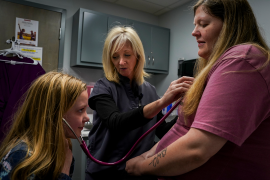Dismal maternal mortality rates in the United States have highlighted our health system’s shortcomings. Now, those deficiencies are colliding with the COVID-19 crisis, a combination likely to heighten existing system failures.
As Congress debates the next COVID-19 relief package, we must prioritize transformation of maternity care to prepare for the more than 300,000 expected births each month in the U.S.
The good news is that we know what is needed. The following solutions will make a difference: launching digital tools such as maternity-specific telehealth to enable connectivity, providing support for community-based organizations to address social needs worsened by COVID-19, strengthening a diverse perinatal workforce, extending postpartum coverage for Medicaid beneficiaries to one year, and investing in births outside the hospital setting.
Congress can move forward on key legislation that builds on existing work to address the maternal mortality crisis. Earlier this year, several bipartisan bills were introduced that would strengthen our maternal health infrastructure. Policymakers should integrate key pieces of those bills into the next COVID-19 relief package.
Ensure Adequate Investment in Telehealth for Maternity Care
Pregnancy care requires frequent interaction with the health care system, which can clash with directives for social distancing. Telehealth for pregnancy-related care allows for reduction in frequency of in-person prenatal visits. Prior to the pandemic, telehealth uptake was slow because of costs, inconsistent payer reimbursement, and limited access to bandwidth, particularly in rural areas. The recent CARES Act facilitates expansion of telehealth services for Medicare during the pandemic. This flexibility should be expanded to other payers, including Medicaid, to allow physician and nonphysician providers to get reimbursed for telematernity care and to fund equipment (e.g., blood pressure monitors) so that people can monitor conditions at home.
Address Social Needs Heightened by COVID-19
It is difficult, yet critical, to address social needs during a pandemic when the safety net is strained. Expanding and extending eligibility for the Special Supplemental Nutrition Program for Women, Infants, and Children (WIC) and ensuring sustainability of programs like Healthy Start and Nurse Family Partnerships are critical. Investing needed social resources, such as safe and affordable housing, transportation, and healthy food, must be prioritized for pregnant people. Just as important is support for community-based organizations that play a critical role in connecting people to services. Further, access to paid leave is an important social determinant of health and has been shown to improve maternal health outcomes and can go a long way in supporting financially stressed families during the pandemic.
Invest in a Diverse Perinatal Workforce, Including Doulas and Midwives Who Can Provide Culturally Appropriate Care
Doulas can facilitate building trust, help navigate the health care system during pregnancy, and identify resources to meet key social needs. Access to a doula and a midwife can be lifesaving, especially for African American and Native American women who are at higher risk of maternal mortality and morbidity. This is even more critical during the COVID-19 pandemic, which compounds social stressors particularly for disadvantaged moms. Integrating midwives also results in improved birth outcomes. With health system capacity stretched, we must align Medicaid payment policy to reimburse these providers and build the capacity of midwives and doulas to augment the maternity workforce.
Extend Postpartum Coverage for Medicaid from 60 Days to One Year
Many low-income people who receive Medicaid coverage as a result of pregnancy are left without health care access during the critical year after birth when nearly a third of pregnancy-related deaths occur. The postpartum period is a critical time, especially now when there is an increased need to address safety, anxiety, and medical concerns. Several federal bills were introduced in 2019 to provide coverage for 12 months postpartum for women with Medicaid-covered births. These bills, which allow states to expand coverage without a waiver process, require funding and could be a model for federal response.
Invest in Sites for Nonhospital Births
Hospitals are becoming overwhelmed with COVID-19 patients, and physician and nursing resources are strained. Temporary facilities have been built and other settings repurposed to manage COVID-19 testing and treatment. Such creativity also may be needed for nonhospital birthing sites that are experiencing increased capacity from expectant parents. Birthing centers have been associated with improved outcomes and satisfaction. However, reimbursement rates for birthing centers are variable, with many women needing to pay out of pocket. Birthing centers should be supported and strengthened; for those states experiencing extreme capacity challenges, expanded ambulatory care centers could be repurposed as birthing sites.
The seriousness of the COVID-19 crisis compels an urgent federal response to invest in maternal health infrastructure. The time to act is now.





